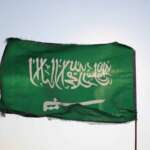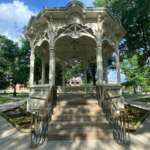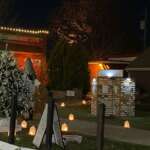A Closer Look at Saudi Arabia
Saudi Arabia Flag

Saudi Arabia Formation Date
September 23, 1932
Saudi Arabia Capital Name
Riyadh
Saudi Arabia Neighbours
Exploring Saudi Arabia
Saudi Arabia: A Rich Tapestry of History, Culture, and Beauty
Saudi Arabia, located in the Middle East, is a country steeped in history and culture. Known for its vast deserts, stunning coastlines, and modern cities, Saudi Arabia has a rich heritage that dates back thousands of years. As a Cultural Commentator and Travel Writer, I have had the privilege of exploring this beautiful country and uncovering its many wonders. In this article, I will take you on a journey through Saudi Arabia, highlighting its geography, history, government, economy, demographics, culture, religion, education, healthcare, sports, tourism, and travel information for foreign visitors.
Key Takeaways
- Saudi Arabia is located in the Middle East and is known for its vast deserts, stunning coastlines, and modern cities.
- The country has a rich history that dates back thousands of years.
- The government is a monarchy with a complex political system.
- The economy is primarily driven by the oil industry.
- The population is predominantly Arab and Muslim.
- Saudi Arabia has a rich culture with traditional art, music, festivals, and holidays.
- Arabic is the official language and Islam is the dominant religion.
- The education system is highly valued and the healthcare system is well-developed.
- Sports are an important part of Saudi Arabian culture with a focus on traditional sports such as camel racing and falconry.
- Tourism is a growing industry in Saudi Arabia with a variety of attractions to explore.
Geography
Saudi Arabia covers an area of approximately 2.15 million square kilometers, making it the 13th largest country in the world. The country is bordered by Jordan, Iraq, and Kuwait to the north, Bahrain, Qatar, and the United Arab Emirates to the east, Oman to the southeast, and Yemen to the south. The Red Sea lies to the west and the Persian Gulf to the northeast.
The landscape of Saudi Arabia is dominated by vast deserts, including the famous Rub' al Khali (Empty Quarter) which covers a large portion of the country. The Arabian Peninsula is also home to stunning coastlines along the Red Sea and the Persian Gulf. The country is rich in natural resources, with oil being its most valuable asset. Other resources include natural gas, gold, copper, and iron ore.
Saudi Arabia experiences a desert climate with extremely hot summers and mild winters. Temperatures can reach up to 50°C (122°F) in the summer months and drop to around 15°C (59°F) in the winter. Sandstorms are common in the desert regions, while coastal areas enjoy more moderate temperatures.
Origin and History
Saudi Arabia has a long and fascinating history that dates back to ancient civilizations such as the Nabataeans and the Kingdom of Lihyan. In more recent history, Saudi Arabia was ruled by various dynasties until 1932 when it was united as one country under King Abdulaziz Al Saud. The discovery of oil in 1938 transformed Saudi Arabia into a wealthy nation and led to rapid development and modernization.
Today, Saudi Arabia is known for its strong ties to Islam and its role as the birthplace of Prophet Muhammad. The country is also home to many historical sites such as Al Ula, an ancient city dating back over 2,000 years, and Mada'in Saleh, a UNESCO World Heritage Site with well-preserved tombs and temples carved into the sandstone cliffs.
Government and Politics
Saudi Arabia is a monarchy with a complex political system. The country is ruled by the Al Saud family, with King Salman bin Abdulaziz Al Saud as the current monarch. The government is divided into three branches: the executive, legislative, and judicial. The King holds ultimate authority and is advised by the Council of Ministers, which is responsible for implementing laws and policies.
The country is divided into 13 administrative regions, each with its own governor appointed by the King. Saudi Arabia also plays a significant role in global politics as a member of organizations such as the United Nations, OPEC, and the Arab League.
Commerce and Economy
The economy of Saudi Arabia is primarily driven by the oil industry, which accounts for over 50% of the country's GDP. The country has the second-largest oil reserves in the world and is one of the leading exporters of oil. In recent years, Saudi Arabia has been working towards diversifying its economy and reducing its reliance on oil by investing in other sectors such as tourism, technology, and renewable energy.
Saudi Arabia has strong trade relations with countries around the world, particularly with its neighboring Gulf countries. The currency used in Saudi Arabia is the Saudi Riyal (SAR), which is pegged to the US dollar.
Demographics
The population of Saudi Arabia is estimated to be around 34 million people, with a majority of Arab descent. The official language is Arabic, but English is widely spoken in business and education settings. Islam is the dominant religion, with approximately 85-90% of the population practicing Sunni Islam.
The population is relatively young, with a median age of 31 years. The country has a high literacy rate, with over 94% of the population being literate.
Culture
Saudi Arabia has a rich and vibrant culture that is deeply rooted in its history and religion. Traditional art forms such as calligraphy, pottery, and weaving are still practiced today. Music and dance are also important aspects of Saudi Arabian culture, with traditional instruments such as the oud and tabla being commonly used.
The country celebrates many festivals and holidays throughout the year, including Eid al-Fitr and Eid al-Adha, which are religious holidays marking the end of Ramadan and the Hajj pilgrimage. The Janadriyah National Festival is a popular event that showcases Saudi Arabian culture through traditional performances, food, and crafts.
Languages and Religion
The official language of Saudi Arabia is Arabic, with various regional dialects spoken throughout the country. English is also widely spoken, particularly in business and education settings.
Islam is the dominant religion in Saudi Arabia, with approximately 85-90% of the population practicing Sunni Islam. The country follows strict Islamic laws, including the separation of men and women in public spaces and a ban on alcohol and pork products.
Education and Healthcare Systems
The education system in Saudi Arabia is highly valued, with free education provided to all citizens. The system includes primary, secondary, and tertiary levels of education. In recent years, there has been a focus on expanding higher education opportunities, with many universities offering programs in various fields.
The healthcare system in Saudi Arabia is well-developed, with both public and private healthcare facilities available. All citizens have access to free healthcare services, and the country has made significant progress in improving public health initiatives such as vaccinations and disease prevention.
Sports and Recreation
Sports are an important part of Saudi Arabian culture, with a focus on traditional sports such as camel racing and falconry. Football (soccer) is also a popular sport, with the national team having participated in multiple FIFA World Cups. The country has also been investing in modern sports facilities and hosting international sporting events, such as the Formula 1 Grand Prix.
Tourism
Tourism is a growing industry in Saudi Arabia, with the government investing in developing the country's tourism infrastructure. The country offers a variety of attractions, including historical sites, stunning natural landscapes, and modern cities. Some popular tourist destinations include the Red Sea coast, the ancient city of Al Ula, and the modern city of Riyadh.
The country also offers a unique cultural experience for tourists, with opportunities to learn about traditional Bedouin life and try local cuisine. The Saudi Commission for Tourism and National Heritage (SCTH) is responsible for promoting tourism in the country and ensuring that visitors have a safe and enjoyable experience.
Travel Information for Foreign Visitors
Before planning a trip to Saudi Arabia, it is essential to understand the visa requirements. Visitors from most countries will need to obtain a visa before traveling to the country. The visa application process can be done online or through an embassy or consulate. It is also important to check the current travel advisories and restrictions due to COVID-19 before planning a trip.
Health and safety should also be a top priority when traveling to Saudi Arabia. It is recommended to follow local customs and etiquette, dress modestly, and avoid public displays of affection. It is also important to respect religious practices, such as fasting during Ramadan.
The local currency used in Saudi Arabia is the Saudi Riyal (SAR), and credit cards are widely accepted in major cities. It is also a good idea to have some cash on hand for smaller purchases and tipping. Prices in Saudi Arabia can vary depending on the location, with larger cities being more expensive than smaller towns.
Quotes
"My father rode a camel. I drive a car. My son flies a jet-plane. His son will ride a camel." - Sheikh Rashid bin Saeed Al Maktoum
"Saudi Arabia is not just about oil, we have a lot of other resources, and we will make them more active in the future." - Crown Prince Mohammed bin Salman
Conclusion
Saudi Arabia is a country that offers a unique blend of ancient traditions and modern development. From its stunning landscapes to its rich culture and history, there is something for everyone to explore and discover. As the country continues to develop and diversify its economy, it will be interesting to see how it evolves while still holding onto its rich heritage and traditions.
Whether you are interested in history, culture, or adventure, Saudi Arabia has something to offer every traveler. With its warm hospitality and welcoming people, it is a destination that should not be missed.
Saudi Arabia Highest Point Name
The highest point in Saudi Arabia is Jabal Sawda, located in the Asir Mountains in the south of the country. The peak is 2,999 meters (9,839 feet) above sea level.
Saudi Arabia Capital Longitude
Riyadh, Saudi Arabia capital has a longitude of 46.75°E
Saudi Arabia Capital Latitude
Riyadh, Saudi Arabia:Capital: Riyadh Latitude: 24.6386 Longitude: 46.6226
Saudi Arabia Official Languages
The official language of Saudi Arabia is Arabic.
Saudi Arabia Ethnic Groups
The majority of the population of Saudi Arabia is made up of ethnic Arabs, with smaller minorities of South Asians, Africans, and other ethnic groups. Over 88% of the people are Arab, most of whom are from the Arabian Peninsula. About 10% of the population are South Asian; they are mainly expatriates from India, Pakistan, Bangladesh, and Sri Lanka. About a quarter of the population (2.9 million people) are from other African countries, mainly from Egypt and Sudan. There are also small populations of Europeans, Kurds, and Turkmen from Central Asia.
Saudi Arabia Religions
Islam is the main religion in Saudi Arabia and is legally acknowledged throughout the country. Over 95% of the population practice Sunni Islam, and the remaining population is mostly Shia. Other religious practices such as Christianity, Judaism, Baha'i, Sikhism, Hinduism, and most other religions are not allowed to be practiced openly in the country. Places of worship are limited to Islamic mosques, and religious symbols are not allowed on public display. Non-Muslims may hold private gatherings, however, Saudi religious authorities sometimes close places of worship for Christians holding secret gatherings.
Saudi Arabia Total Area
The total area of Saudi Arabia is 2,149,690 square kilometers (830,000 square miles).
Saudi Arabia Land Area
The total land area of Saudi Arabia is approximately 2,149,690 square kilometers (830,000 square miles).
Saudi Arabia Water Area
The total area of Saudi Arabia is 2,149,690 km2, of which approximately 2.15% is water. The majority of the water bodies in the country are located in the western region, including the Red Sea, the Gulf of Aqaba, and the Gulf of Aden. These regions contain several islands, including Farasan, off the southwest coast. The Persian Gulf region is also home to numerous coral reefs and around 360 islands. There are a number of smaller rivers in Saudi Arabia, but most are used for agricultural purposes and provide limited amounts of water.
Saudi Arabia Total Population
As of July 2020, the total population of Saudi Arabia is estimated to be 33,739,286.
Saudi Arabia Currency Name
The Saudi Riyal (SAR)
Saudi Arabia Currency Code
The currency code of Saudi Arabia is SAR (Saudi Arabian Riyal).
Saudi Arabia Currency Symbol
SAR
Saudi Arabia Time Zones
- Standard Time: UTC+03:00
- Daylight Saving Time: UTC+04:00
UTC+3, Saudi Arabia follows the Arabian Standard Time (AST) throughout the year with no daylight savings time. This is three hours ahead of Coordinated Universal Time (UTC). All of the country, except the very east, falls in the same time zone. The UTC+3 time zone is the same for the entire country. The most eastern region of Saudi Arabia falls in the UTC+4 time zone, and includes sovereign states Musandam exclave as well as Ra's al-Khaymah.
Saudi Arabia Calling Code
The Saudi Arabia country calling code is +966
Saudi Arabia Internet TLD
www.aveholidays.sa
How to Say "Saudi Arabia" In Different Languages?
- Simplified Chinese
- 沙特阿拉伯 (zh-Hans-CN)
- Finnish
- Saudi-Arabia (fi-FI)
- French
- ArabieSaoudite (fr-FR)
- German
- Saudi-Arabien (de-DE)
- Greek
- ΣαουδικήΑραβία (el-GR)
- Hungarian
- Szaúd-Arábia (hu-HU)
- Hindi
- सउदीअरबिया (hi-IN)
- Hebrew
- ערבהישראלית (he-IL)
- Italian
- ArabiaSaudita (it-IT)
- Japanese
- サウジアラビア (ja-JP)
- Dutch
- Saoedi-Arabië (nl-NL)
- Polish
- ArabiaSaudyjska (pl-PL)
- Portuguese
- ArábiaSaudita (pt-PT)
- Romanian
- ArabiaSaudită (ro-RO)
- Russian
- СаудовскаяАравия (ru-RU)
- Serbian
- Саудијска Аравија (sr-RS)
- Spanish
- ArabiaSaudí (es-ES)
- Swedish
- Saudiarabien (sv-SE)
- Ukrainian
- СаудівськаАравія (uk-UA)
- English
- SaudiArabia (en-US)
Saudi Arabia Popular Holidays
- Al-Hijra
- 1 January
- New Year's Day
- 1 January
- Enthronement of the Prophet Mohammed
- 8 January
- Maulid an-Nabi
- 17 January
- Crown Prince’s Accession Day
- 22 January
- Milad al-Nabi
- 24 January
- Laylat al-Barat Holiday
- 13 February
- Laylat al-Barat
- 14 February
- Lailatul Miraj
- 25 February
- Lailat Al-Mi'raj
- 26 February
- Saudi Solidarity Day
- 23 March
- Repeal of Segregation Day
- 25 March
- Lailat al-Mi’raj
- 4 April
- The Fasting of Ramadan
- 7 April (5 May)
- Lailat-ul-Isra Wa Mi'raj
- 10 April
- The Advent of the Prophet Muhammad
- 11 April
- Birthday of the Prophet Muhammad
- 12 April
- UPU Day
- 14 April
- Ramadan
- 15 April (13 May)
- Al-Isra Wal Miraj
- 21 April
- The Isra Wal Miraj Observance
- 23 April
- Lailatul Miraj Festival
- 10 May
- Ramadan Feast
- 14 May (15 May)
- Laylat al-Qadr
- 19 May
- Yawm al-Tarweeh
- 20 May
- Lailat Al-Qadar
- 21 May
- Eid al-Fitr
- 31 May (4 June)
- Watani al-Eid
- 1 June
- Eid al-Fitr Holiday
- 4 June (6 June)
- The Final Day of Ramadan
- 13 June
- Yawm-ut-Tarweeh
- 19 June
- The Laylat al-Qadr
- 20 June
- Isra & Mi'raj
- 2 July
- Eid al-Takbeer
- 6 July
- At-Takbeer
- 7 July
- Eid al-Ghadeer Festival
- 11 July
- Eid al-Ghadeer
- 19 July
- Hajj
- 9 August (14 August)
- Eid al-Adha
- 11 August (15 August)
- Eid al-Adha Holiday
- 15 August (17 August)
- Eid al-Ghadeer Holiday
- 19 August
- Ashura
- 19 August
- The Day of Sacrifice
- 21 August
- The Feast of Sacrifice Observation
- 22 August
- The Day of Sacrifice Holiday
- 22 August
- Start of the Islamic Year
- 22 August
- Wechseljahr Festival
- 23 August
- Al-Hijra
- 30 August
- Hijri New Year
- 30 August
- Eid al-Qurban
- 1 September (2 September)
- Eid al-Qurban Holiday
- 3 September (5 September)
- Start des islamischen Jahres
- 22 September
- Saudi National Day
- 23 September
- Hijra-Neujahr
- 30 September
- Al-Mulhid Festival
- 3 October
- Arafah Day
- 9 October
- The Day of Arafah
- 9 October
- The Night of Ascension
- 11 October
- Al-Mulhid Festival 17th
- 17 October
- Lailat-ul-Isra Wa Mi'raj Holiday
- 20 October
- The Day of Ashura
- 20 October
- Lailatul Isra Wa Mi'raj
- 6 November
- Al-Isra Wal Miraj
- 7 November
- Eid al-Mawlid
- 30 November
- Jumanah
- 17 December
- Es-Sayyid-u’l-Awwal
- 22 December
- Eid al-Mawlid Holiday
- 30 December
- New Year's Eve
- 31 December







